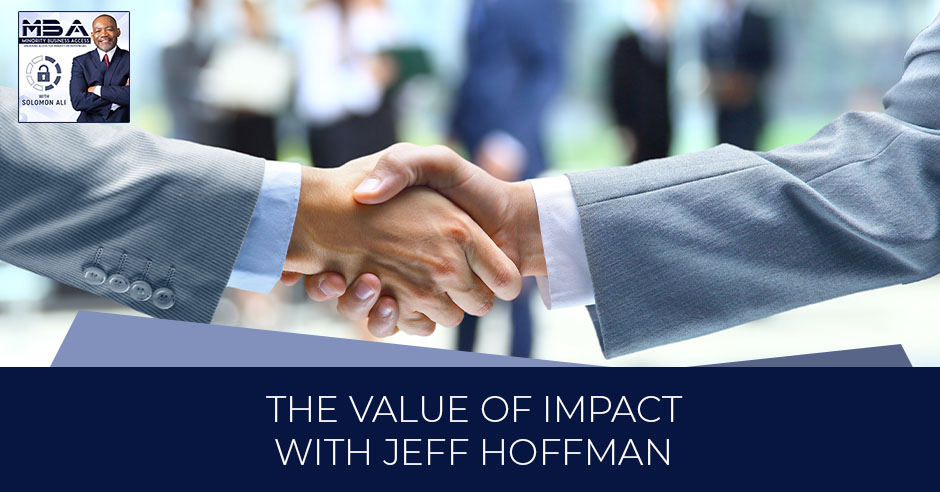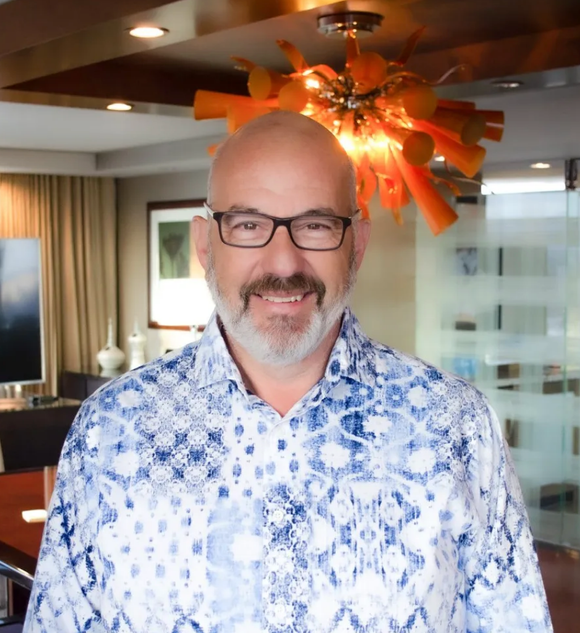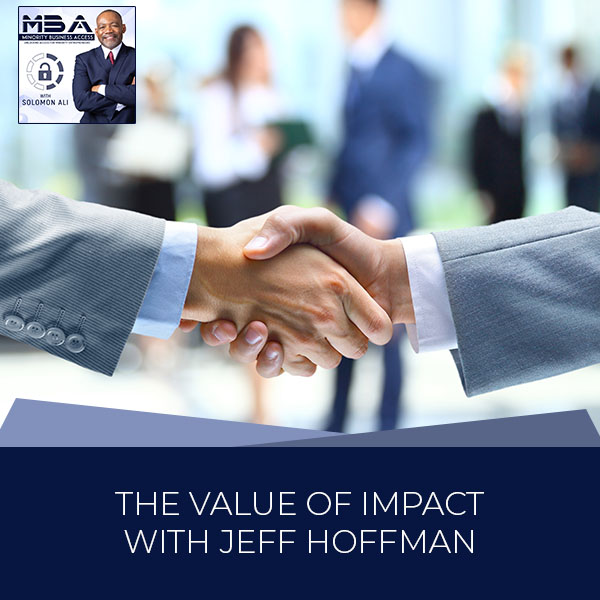
Being at the top would not be as lonely if more people reached down to uplift another person. As a man of many accolades and high achievements, Jeff Hoffman, founder of Priceline.com, understands that true power begins and remains with the people we pour into, which is why he prides himself most in serving communities who are underserved and otherwise systematically excluded from resources and opportunities. In this insightful episode of Minority Business Access, Solomon RC Ali, and Jeff Hoffman discuss the value of impacting and empowering communities through education, building networks, and mentorship.
—
Watch the episode here
Listen to the podcast here
The Value Of Impact With Jeff Hoffman
I’m so excited and thrilled that you are on the show. What I want you to do is go ahead tell my audience who you are and what you’ve done.
My name is Jeff Hoffman. I am a tech entrepreneur. I’ve been building tech companies, internet companies and was part of a lot of companies like Priceline.com, which is Booking.com and uBid.com as well. That’s the space I’ve been in. I’m so excited to be here with you because I’ve been doing a lot to support underserved communities. For example, I did the keynote at the Black Business Expo in Houston, Texas. That’s about 15,000 black business owners. I did the Black Tech Week in Miami. I did the Bronner Brothers Hair Show in Atlanta.
I’ve been trying to help communities that get less attention. Minority business is everything we can do to create more, do encourage more people to help them build their businesses is important to me. It’s a mission I’ve taken, so I was so excited to get a chance to talk to you. That’s what I’m spending my time on now. How do we help other people improve the lives of people around them? One of the ways to do that is to turn an idea into a profitable business. It enables you to take care of a community and a lot of other things.
What would be some advice that you’ve given to minorities in business?
The first piece always starts with education. Education is not equally accessible around this country, but in a lot of cases, it’s economically based, etc., but that’s an excuse. I’m tough on you. I work with a lot ex-cons now and I’m tough on them. These are good people that made a bad decision. They’re not bad people. They were in tough situations and made the only decision they thought they could, now they want to turn their life around. We’re tough on them. The education, if you can’t get it, find it. We live in an internet age where you can take courses on Coursera, and you can study TED Talks. The first step is to get educated anywhere, anytime, all the time, and continue to learn. That’s the first piece of advice we give them.
Get educated anywhere, anytime, and all the time.
The second piece is about building your network and you build your network before you need it. I am an engineer. I’m not a finance guy. The list of things I don’t know how to do is way longer than the list of stuff I do. What you got to do is surround yourself with people smarter than you. We teach them the value of networking and how to find and reach out to people that are smarter than you everywhere and build that network around you. The third step is you’ve got some education, resources, people to go around you, now you’ve got to solve a real problem in the world.
Economic prosperity, independence, freedom comes from solving a problem that is valuable to somebody in the world. Quickly, my first startup, when I was twenty-something, you used to have to wait in line to check-in at an airport at the ticket counter and my first product was those kiosks that you check-in at in an airport. I solved a real problem. Every airport line in the kiosk, people didn’t want to wait in line, and that enabled me to obtain economic freedom because I solved somebody’s problem. That’s the third thing we shared with them.
That being said, Jeff, when starting a business and running your business, a lot of entrepreneurs, especially minorities, are under-capitalized. What do you suggest they do?
That is a two-sided problem. A big part of that is reaching out to the other end. It’s people that do things like you do. You give back so much and help so many people. We need more of the people, once they make it, to turn around, reach back, grab the hand of somebody that needs the help and pull them forward. First of all, we need more business angels. I actually like the fact that they use the term angels because sometimes they are. We need more successful people that came out of the situation that are minority role models to help. They need to reach back and help. That’s the first step. Business angel networks are important. We go into communities like Ferguson. We went to Baltimore or wherever there was trouble. We went into a lot of these communities. I do this with Ray Lewis, the football player who’s a friend of mine. Sometimes Jim Brown comes. We’ve gone into these communities to try to fire up the community. We then ask the corporations and the companies to step up. People need to help their own. These are your people.
These are the entrepreneurs in your community. Help them start a business. That’s one end. On the other end, part of the reason that they have trouble getting funding is they haven’t been given the training on how to pitch this stuff. I sit through these pitches. We did one here in LA. We called it Black Tech Day. We had all these minority entrepreneurs pitch businesses. I thought, “Has anybody ever taught you guys how to present your idea and how to pitch?” They said no. I said, “If we could get you more training on how to pitch an idea and how to write an investor deck, how to do all that stuff, your odds would go up with getting funded.” There’s a bunch of things we need to do at once. They will increase minority funding for a business.
What you’re doing is totally awesome, especially in the minority community. If a new entrepreneur in a minority community is starting, they could be male or female, what would you suggest other than reading the book and building their network? What else would you suggest?

Value of Impact: Economic prosperity, independence, freedom come from quickly solving a problem that is valuable to somebody in the world.
One of the important things is finding mentorship. That’s the other thing that you and I need to do. We need to encourage more people in every community to be mentors in their own community. A lot of people say, “I’ve never built a business. How can I be a mentor?” How about because you’re an HR executive at a big company and you know everything about HR and this entrepreneur doesn’t know anything about hiring people? Almost everybody has some value that they could provide as a mentor. They don’t think of themselves as mentors. What you and I have to do is tell them, “Your knowledge is valuable to this community. You need to mentor.” What I tell these people is you got to find a mentor.
Mentors aren’t going to ring your doorbell. You got to reach out the way I found my first mentor. I showed up at a social event on a Saturday, he was going to it. I bought a ticket and he’s like, “What are you doing here?” I said, “I’m just checking it out.” We met at a social event because I couldn’t get an appointment in his office. I found out he was going to this thing on Saturday. I bought a ticket and showed up, wandered over, and met the guy. Go out and find a mentor. Find somebody that can help you. If you’re on the other side of the equation, find a way to be a mentor. It’s important to have someone to turn to.
One of the things I remember when I started my first business, I was going to get a $1 million loan and I had to call the guy every day for six months. I would call him and they were like, “We have nothing different to tell.” I say, “Okay. I’m just calling to let you know I’m still here.” After the sixth month, he said, “I’m going to do this loan for you. No problem. Anyone who calls me 180 days straight, he’s going to pay me back.”
Persistence is so important. For them to see that in you, that’s good advice to give these startups. You got to persist.
I have found that the world is very challenging. It’s up and down. When you’re in that low spot and business is not going well, everyone around you is telling you to abort it and do something else, what would you say?
That is the reason you’ve got to find your tribe. First of all, all of us have been through failure. Nothing ever goes perfectly. Life is messy. That’s God’s plan. If everything went perfectly, it’d be a pretty boring life here if we didn’t have the stuff to deal with. You have to believe you’re never giving more than you can handle. There is that belief as well. You’re being tested for reasons so that you can come out stronger. What I mean by finding your tribe is someone’s been through this. If someone came through the other side, you got to find that person that can give you an honest assessment. One of the things I said on the stage here at this event is you tend to get our advice from proximity and not relevance.
Almost everybody has some value that they could provide as a mentor. They just don’t think of themselves as such.
Meaning your buddies, your spouse, your mom is telling you it’s a bad idea. In fact, you’re not qualified to say that. If I was a young entrepreneur and everything seemed to be going bad, and I got a chance to talk to Solomon and you say, “It’s fixable, here’s what you need to do,” I would believe in him. I would have connected with someone who’s been there, who’s done that, and who’s advised by the same token. If you said to me, “Jeff, I’m not seeing it. Maybe you should spend your life’s energy on something else,” I would take that advice. Find those people, find the tribe, find the people who have been there, done that whose advice can help you make that decision. If those people tell you to keep going, then keep fighting.
For my audience, how do they reach out to you and contact you?
It’s Jeff@JeffHoffman.com. I made it easy. My website, you’ll be surprised, it’s called JeffHoffman.com so they can find me there. The social media I’m on the most is LinkedIn. I’m on there every day. The other social media, I don’t get to as much, but either LinkedIn or Jeff@JeffHoffman.com. I love connecting with people because in the end, the next great idea is going to come from someplace we never thought of. Sometimes people think because they have a low status in society that they’re less important or less intelligent. No, intelligence is equally distributed across the whole planet. Opportunity is not. That’s the problem you’re fixing it. There are brilliant people. I got to tell you a quick, funny story.
I was dealing with a former drug dealer and he got out. He was trying to turn his life around. He wanted to start a tech company. He knew he made mistakes. He didn’t want to make them again, so I was teaching him how to run a business. I said, “Let’s talk about cashflow.” He said, “I am all over that.” I said, “Let’s talk about building teams.” He said, “I know how to do that.” I said, “Let’s talk about marketing.” He said, “I already got that.” I said, “You know who makes a good entrepreneur? Unfortunately or fortunately, drug dealers.” He already knew how to do all that stuff.
He had a skillset. What he needed was someone to believe in him and someone to tell him that he didn’t have to go back to the old way. We have to change the friends around him, but he’s doing amazing now. People like you and I got to be out there pushing them. We’ve got to go out there encouraging them and finding people that can make a difference because they can. This is a guy that society wrote off because he was in federal prison. In fact, this is a guy who might be one of the world changers now if somebody believed in him.

Value of Impact: One of the ways to help people improve their lives is to turn an idea into a profitable business that enables you to take care of a community.
Lastly, can you tell us about your greatest success?
I can. You know that saying that the two most important days in your life are the day you’re born and the day you figure out why. Mine has nothing to do with business. I was blessed enough to have several of the companies I was part of are multi-billion-dollar companies. It’s none of that, and be part of an IPO, it has nothing to do with any of that. We’ve been blessed enough that we won a Grammy in the music business and we won an Emmy. None of those things came anywhere close to the first time somebody encountered me. By the way, this was a 40-year-old Black man that was down on his luck. The world had dealt him every bad hand you ever could, he had every reason to give up and everybody wrote him off from society, and I spent a couple of days with him.
Years later, I was at a conference. A very well-dressed gentleman like you, very refined, came up and started talking and all of a sudden, he said, “You don’t remember me, do you?” I said, “We met?” He goes, “Four years ago.” I said, “I don’t remember the event.” He said, “I was on the street. I was down and out. I was thinking of committing suicide.” He said he spent a couple of days with me and it literally turned his life around. He said, “You lit the spark that caused me to believe again. Now I own a business. I have employees, my kids are in college, I have a home now. If you didn’t spend that time with me, I wouldn’t be standing here.” That was the coolest moment of my life to find out that we can change somebody else’s life by sharing our time with them.
That reminds me of a moment because a lot of people ask me the same question. They think I’m going to talk about all being number five or whatever minority event, cornering the technology market and then smart homes. I’m like, “No. A little more something basic to help someone and to see them make it. that’s the greatest thing.” They were like, “It’s not this or that?” I said, “No, it’s not. It’s just helping someone.”
Intelligence is equally distributed across the whole planet. Opportunities are not.
I’m inviting you. I want you to come to see it. We are doing a project now in Watts. I’m working with former leaders of the Bloods and Crips. These are the guys that are now fathers, husbands, and they have children. They’re the ones that negotiated the famous gang truce back in the ‘90s between the Bloods and the Crips. They’re now older and they have families. They want to restore Watts, Compton to the old family neighborhood that’s safe again and they don’t want their kids shot on the streets. We’ve been tearing up lots and rebuilding it and working with these former gang members, and showing how a community can reinvent itself. Every time I go there, I feel like my chest is going to burst because of the pride of what they’re doing, they’re doing this themselves. I would like to invite you to come to visit. You’ll be blown away by people that society wrote off who are rebuilding their community to make it family-friendly and it’s working. The project is incredible.
I will be there. I would like to thank you so much for coming to the show.
Thank you for having me. I appreciate it.
Important Links
- Jeff Hoffman
- Priceline.com
- Booking.com
- uBid.com
- Jeff@JeffHoffman.com
- LinkedIn – Jeff Hoffman
About Jeff Hoffman
 Jeff Hoffman is an award-winning global entrepreneur, proven CEO, worldwide motivational speaker, bestselling author, Hollywood film producer, producer of a Grammy Award-winning jazz album, and executive producer of an Emmy Award-winning television show. In his career, he has been the founder of multiple startups, he has been the CEO of both public and private companies, and he has served as a senior executive in many capacities. Jeff has been part of a number of well-known successful startups, including Priceline.com/Booking.com, uBid.com, and more.
Jeff Hoffman is an award-winning global entrepreneur, proven CEO, worldwide motivational speaker, bestselling author, Hollywood film producer, producer of a Grammy Award-winning jazz album, and executive producer of an Emmy Award-winning television show. In his career, he has been the founder of multiple startups, he has been the CEO of both public and private companies, and he has served as a senior executive in many capacities. Jeff has been part of a number of well-known successful startups, including Priceline.com/Booking.com, uBid.com, and more.
Jeff is the CEO of Driving Force Enterprises, a strategic consulting firm that teaches exponential growth to business owners and entrepreneurs, as well as teaching innovation strategies to corporations and governments worldwide. Jeff serves on the boards of companies in the US, Europe, the Middle East, South America, Africa, and Asia. He supports entrepreneurs and small businesses worldwide. He is the Chairman of the Global Entrepreneurship Network, which works with entrepreneurs in 180 countries, as well as being a founding board member of The Unreasonable Group, whose startup companies have operations in 185 countries and have raised over $4 billion in funding. He is also the Global Chairman of Dream Tank, a worldwide youth problem-solving network. Jeff supports the White House, the State Department, United Nations, and similar organizations internationally on economic growth initiatives and entrepreneurship programs.
Jeff is a frequent keynote speaker, having been invited to speak in over 60 countries. He speaks on the topics of innovation, entrepreneurship, and business leadership, and is the author of the book SCALE, a how-to guide for growing your business. Jeff also teaches innovation workshops to major corporations on a regular basis.
Jeff is a featured business expert seen on Fox News, Fox Business, CNN, CNN International, Bloomberg News, CNBC, ABC, and NPR, and in publications including Forbes, Inc., Time, Fast Company, the Wall Street Journal, and more.
Jeff was honored with the Champion of Entrepreneurship Award from JP Morgan Chase, Citibank, and Rising Tide Capital, as well as receiving the George Brown Award for International Cooperation from the US State Department. Jeff received the Commitment to Excellence Award from CitySummit in 2019, as well as receiving a Lifetime Achievement Award and being inducted into the Entrepreneurs Hall of Fame for his contributions to the field of entrepreneurship. He was also honored with the Best of the Best Award from the national CEO association (Collegiate Entrepreneurship Organization).
Outside of the world of technology, Jeff has produced TV shows, has produced movies in Hollywood, has produced musical events including concerts, tours, and charity events with such artists as Elton John, Britney Spears, NSYNC, Boyz II Men, and others, and serves on numerous charity and non-profit boards.

